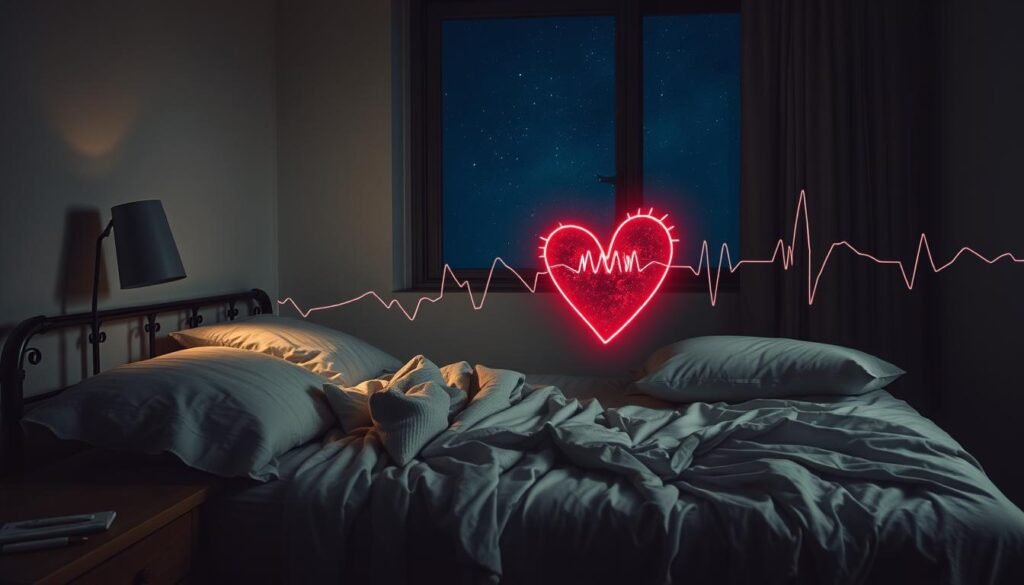About 40 million adults in the United States battle anxiety disorders. This high number shows how common anxiety and its physical signs, like tremors, are. When we’re scared or stressed, our bodies can shake. This is our fight-or-flight response kicking in. Anxiety tremors make this worse, especially for those already dealing with conditions like essential tremor. Understanding anxiety’s physical effects, such as a fast heartbeat or shaking, is key. It helps those affected find ways to cope. Luckily, there are many calming methods available. These include therapy, meds, and making changes in daily life. These strategies help manage the tough symptoms of anxiety.
Key Takeaways
- Anxiety tremors are physical symptoms of anxiety that can lead to discomfort.
- Approximately 40 million adults in the U.S. suffer from anxiety disorders.
- Anxiety can disrupt sleep, causing symptoms like anxiety heart racing when trying to sleep.
- Effective management includes therapy, medication, and various calming techniques for anxiety.
- Recognizing triggers and symptoms is vital for effective coping strategies.
What Are Anxiety Tremors?
Anxiety tremors are when you shake because you’re very anxious or scared. This shaking starts because your body is reacting to fear. It releases adrenaline, which causes these shakes. Even though they can feel scary, they’re not dangerous.
These tremors, also known as somatic anxiety symptoms, can happen in different situations. Stress, hormone changes, and health problems can make them worse. It’s important to understand all the causes behind these tremors.
For example, stress from money issues or relationship troubles can lead to symptoms like feeling out of breath or dizzy. Health problems like asthma or COPD can also cause these feelings. They might seem like they’re due to anxiety.
Research shows that people can have panic attacks at night, moving from sleep to wakefulness. They might sweat, have a fast heartbeat, and shake. These attacks can make someone feel very anxious and upset. Knowing about these links can help in dealing with them. You can learn more here.
In short, knowing what causes anxiety tremors and their symptoms can help. It can lead to finding ways to manage them and getting the right treatment.
Common Symptoms of Anxiety Tremors
Anxiety affects people in different ways, making life tough for them. Knowing the common symptoms is key for handling it better. A racing heartbeat is often felt during high stress. It seems like the heart is pounding hard, increasing panic or discomfort.
Shaking is another common sign, possibly due to high stress hormones. Many also feel their muscles getting tight, like in the shoulders, neck, or jaw. It becomes hard to focus or stay engaged in tasks or conversations.
Feelings of fear, sickness, and quick irritability are also common with anxiety tremors. People may get upset easily or have sudden mood changes. This makes socializing and everyday tasks more difficult. Anxiety can also cause headaches and tiredness, making it harder to deal with.
Knowing all about anxiety symptoms helps people find ways to feel better. Changing lifestyle habits or getting professional help can make a big difference. Trying natural ways and learning how to cope are also good steps.
Understanding these anxiety symptoms is crucial for those dealing with anxiety tremors.

Understanding the Fight-or-Flight Response
The fight-or-flight response is a body’s natural reaction to danger. It readies the body to either fight back or run away from harm. Stress hormones like adrenaline are released, sparking an anxiety physical response to boost chances of survival.
This reaction causes many changes in the body. The heart beats faster, muscles get more blood, and they tense up. These changes can lead to trembling, fast breathing, and a strong sense of fear, which are signs of a panic attack.
Knowing about the fight-or-flight response helps in managing stress more efficiently. Recognizing what triggers this response and how past experiences affect it is helpful. Techniques to calm oneself can lessen stress and anxiety’s effects.

For extra details on how this response works, visit this article. It offers extensive information on the topic.
| Response Type | Physiological Changes | Common Symptoms |
|---|---|---|
| Fight | Increased heart rate, muscle tension | Anger, agitation, trembling |
| Flight | Rushed breathing, adrenaline surge | Panic, overwhelming anxiety |
| Freeze | Muscle rigidity, slowed heart rate | Shock, disconnection from surroundings |
| Fawn | Increased social engagement, compliance | People-pleasing behaviors, anxiety relief |
This table shows the different ways people react to stress. Each response aims at protecting us from what we see as dangerous. Knowing how you respond can help you deal with anxiety better.
Anxiety Heart Racing When Trying to Sleep
Anxiety greatly affects our sleep quality. Many of us struggle with a racing heart when trying to rest, feeling uneasy. It’s key to understand sleep anxiety to manage these symptoms well.
Connection Between Anxiety and Sleep Disturbance
Racing hearts during sleep often come with high anxiety levels. This problem is linked to the body’s response to stress. Many factors, like health issues and even caffeine, can make it worse, leading to troubled sleep.
Impact of Racing Heartbeat on Rest
A fast heartbeat at night can cause fear and ruin sleep. This results in tiredness, mood changes, and poor daily function. Finding out what causes your sleep anxiety is crucial. Look at daily stress, health issues, and how you sleep. It helps to talk about these with a doctor.

| Trigger | Effects |
|---|---|
| Caffeine | Elevates heart rate, potentially causing nighttime palpitations |
| Dehydration | Increases forcefulness of heartbeats, leading to palpitations |
| Sleep Position | Lying on the back or left side may heighten the risk of palpitations |
| Stress and Anxiety | Heightened anxiety can cause a racing heartbeat and sleep disturbances |
| Medical Conditions | Heart disease, arrhythmias, and sleep apnea contribute to nighttime palpitations |
Causes of Anxiety Tremors
Anxiety tremors come from different causes, like physical or psychological issues. Knowing why they happen is key for managing them well. This is important to get better.
Physical Triggers
Things like being very tired or not drinking enough water can cause anxiety shakes. So can too much coffee or certain health problems. High stress and bad sleep also play a big part.
These issues can make your body react strongly. You might sweat, have a fast heartbeat, or feel sick. Knowing and fixing these causes can really help with anxiety.
Psychological Triggers
Fear of public speaking or meeting new people can cause anxiety shakes. Having a lot of stress, negative thoughts, or past bad experiences matters too. So does dealing with social anxiety.
It’s important to understand these psychological causes. Treatments, like Cognitive Behavioral Therapy (CBT), can help. They work on the deep reasons for anxiety and can reduce shaking.
| Type of Trigger | Examples | Impact on Tremors |
|---|---|---|
| Physical | Exhaustion, dehydration, caffeine | Increases sympathetic nervous system activity |
| Psychological | Public speaking, social situations | Intensifies feelings of fear and anxiety |
| Health Conditions | Parkinson’s disease, essential tremor | May complicate or exacerbate anxiety symptoms |
Effects of Sleep Anxiety and Insomnia
Sleep anxiety affects our health and well-being a lot. Many people can’t sleep well. They feel restless and anxious all night. This creates a scary environment. Night panic with racing heartbeats and fear can happen. Nighttime palpitations add to the trouble. This makes a cycle of sleep issues that harm daily life.
Understanding Night Panic and Palpitations at Night
Night panic can start suddenly. It makes you feel very scared and your heart beats fast. This happens a lot to people with anxiety. Studies show 20% to 45% of those with panic disorder have attacks at night. These night palpitations disturb sleep and make sleep anxiety worse.
The Role of Nocturnal Anxiety in Sleep Disturbance
At night, anxiety can keep you awake. Around 40% of people with anxiety have trouble sleeping. When stressed for a long time, it’s hard to fall or stay asleep. This is true for over one-third of adults with chronic insomnia. Good habits like keeping a sleep schedule and relaxing can help a lot. They improve sleep despite anxiety.
| Health Issue | Impact |
|---|---|
| Chronic Insomnia | Affects nearly one-third of adults, impairing daily functioning. |
| Anxiety Disorders | 40 million American adults are affected, making anxiety the most common mental health issue. |
| Sleep Disturbance | Can lead to risks such as chronic anxiety, depression, and a weakened immune system. |
| Daytime Sleepiness | Results from poor sleep quality, affecting productivity and mood. |
How to Cope with Anxiety Tremors
Dealing with anxiety tremors means using both relaxation and therapy. You can ease the shakes by tackling anxiety’s root causes. Methods that calm you down can manage symptoms and lessen tremors.
Relaxation Techniques
There are many ways to calm tremors caused by anxiety. These approaches foster peace and help control anxiety:
- Deep Breathing: Slow, deep breaths activate your body’s chill mode, easing stress.
- Progressive Muscle Relaxation: Tensing then relaxing muscles sheds physical tension and stress.
- Mindfulness Meditation: Staying in the now helps you let go of stressful thoughts, bringing tranquility.
Cognitive Behavioral Therapy (CBT)
Cognitive Behavioral Therapy tackles anxiety-inducing thoughts. CBT helps folks change negative mindsets linked to anxiety. The therapy offers a few perks:
- It sheds light on what kicks off your anxiety tremors.
- Gives you tools to reshape dark thoughts.
- Supports healthy ways to face anxiety symptoms.
Combining relaxation with cognitive therapy is a strong plan for anxiety tremors. These methods boost your control over anxiety, uplifting your health.
Role of Medication in Treating Anxiety
When it comes to anxiety disorders, medication plays a key role in treatment. Many types of anxiety medications are available, depending on the symptoms and individual needs. It’s crucial to deeply explore these options to choose the best method.
Types of Medication for Anxiety Disorders
Benzodiazepines and SSRIs are among the most used anxiety medications. Drugs like Xanax and Valium offer quick relief but may lead to dependence. SSRIs are better for long-term use but take weeks to start working.
Consulting a Doctor for Treatment Options
It’s vital to consult a doctor for a personalized approach to treating anxiety. They can recommend medications like buspirone or beta-blockers based on individual cases. Open talks about side effects and health history aid in managing anxiety better.